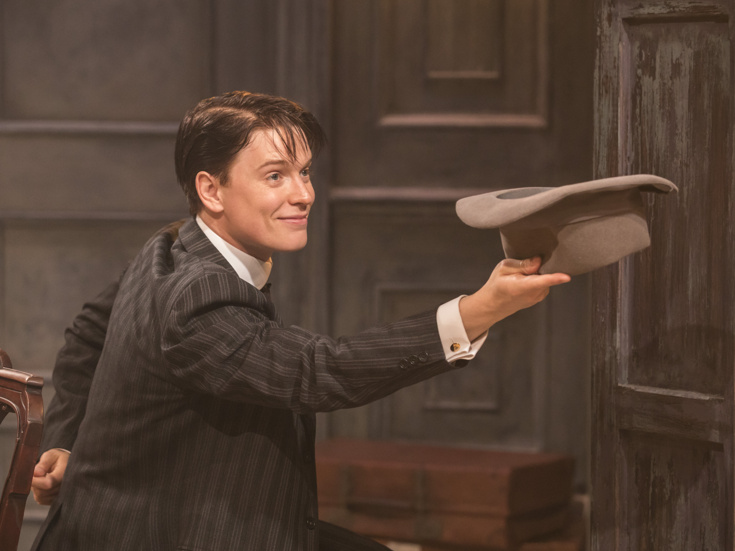West End Travesties Star Freddie Fox on How Stoppard Makes You Smarter, John Hurt's Words of Wisdom & Not Going Hollywood

(Photo: Johan Persson)
Freddie Fox has appeared on the London stage opposite Lindsay Duncan in Hay Fever and Rupert Everett in The Judas Kiss, among many other credits, but is currently giving the stage performance of his career so far as Tristan Tzara, the Romanian-born French Dadaist and poet at the seriocomic heart of Travesties. The director Patrick Marber's brilliant production of Tom Stoppard's Tony-winning play has transferred to the Apollo Theatre for a commercial run after bowing last fall at the Menier Chocolate Factory, and the chatty and engaging Fox spoke to Broadway.com about the exhilaration he has felt all along the way.
Was it inevitable that this production would transfer from the Menier to the West End, given the depth of talent involved?
I think it's always a surprise. Yes, we were sold out before rehearsals started and that was a good start, but then it was all about the work that goes into making a production worthy of a transfer. As actors, you live in doubt; that's one of the truths of the particular job. But I suppose when it got good write-ups and people began responding to it, we thought an offer might be on the cards—but it's never a given, for me at least, until it happens, even when people say it is.
Were you a Stoppardian already in terms of prior familiarity with Sir Tom's work?
Not really, for my sins. I'd seen a lot of his plays like Hapgood and Arcadia and others, but the only real contact I had ever had with him was when I did Parade's End and got to spend time on set with him—but that was a TV show. When I first looked at Travesties, I thought, "I don't know what to make of the first page of this, let alone 80 pages." But I just thought, "Well, I'll go along for the audition because I love all the people involved."
Does it really matter if you don't understand every second of this whirligig of a play, set in Zurich in 1917—or if the audience doesn't?
That's a great question, and the fact is that we didn't understand what was going on all the time, but it didn't matter because of the nature of the production. You cling on to what you do get and ride with it. It's very much a testament to Patrick's production that people feel it is accessible since, on the face of it, a lot of it does seem pretty dense.
Do you feel smarter as a result of doing this play?
That can go one of two ways: You can think, "Oh God, I really am so stupid that I can't even go to the theater anymore," or in the case of this, I actually feel elevated by it. I was filming in Dublin in between the West End run and this and I went to the Irish Art Gallery and bought [Alex Danchev's book] 100 Artists' Manifestos: From the Futurists to the Stuckists and am looking forward to reading it. I definitely wouldn't have done that six months ago, and now Tom has inspired me with his intelligence to go and find more intellectually stimulating things.
What should the audience take away from the play?
I hope they come away thinking, "Wow, that not only made me howl with laughter but picked me up and moved me at the same time." Tom's work has a way of elevating people who come in contact with it.
How do you get your head around some of the aspersions Tzara fields in the text, like when he refers to Joyce as "you supercilious streak of Irish puke"?
That's the joy of this play. It’s about ideals and ideas and not whose cock is bigger and who has a bigger fist: they can really let rip at each other but in a way that has no physical jeopardy. There's more fun to be had in trying to tear down somebody's idea and go, "No, mine is better!"
Is there some poignancy in the fact that your part's creator back in 1974—the great John Hurt—recently died?
I spoke to John when I was starting to do my reading and research. I called him and asked whether he had any words of wisdom. He was in hospital at the time having treatment and wasn't in the prime of health, as you could hear from his voice, but he spoke of it with great energy and fondness and passion. He said that the most important and abiding thing was that I was going to have so much fun, and I do feel that he is around somewhere watching it.
What about doing the whole America—or Hollywood—thing: is that beckoning?
It comes up, of course, especially with film more than theater. I don't have an American agent, though I did when I was younger. At this particular moment in my life, it's not really for me; I feel as if they speak a slightly different parlance, a slightly different language.
Meaning what?
I prefer the way that we conduct business here, if I'm perfectly honest, and in my very limited experience, until the wonderful lead roles come up—or if they ever come up, and that's a big if—then perhaps I will have to enter into the system a bit more, but at this moment in time, I'm very content with the work I'm doing here. If it stays like this forever and I am still working, I will be very lucky. At least that's my angle at the moment—that being said, I would love to come and do a play in New York. Hell, yeah!